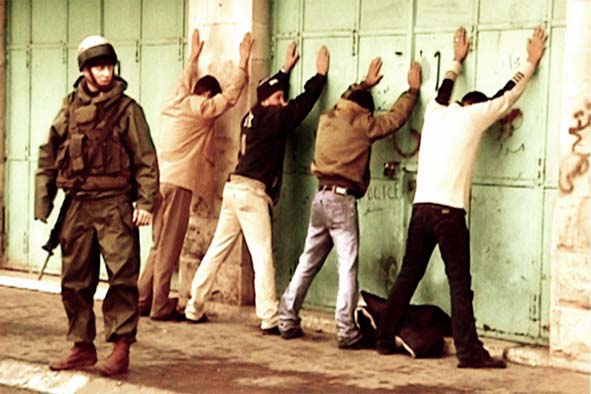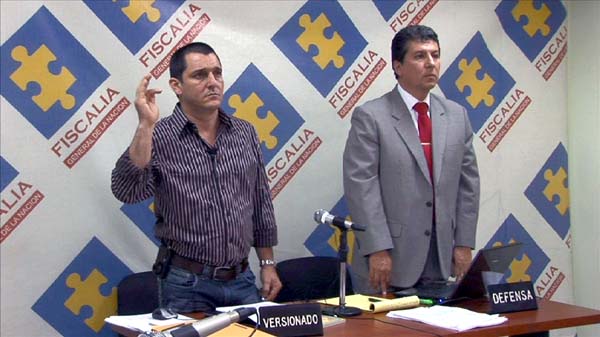|
Reviews of Recent Independent, Foreign, & Documentary Films in Theaters and DVD/Home Video

Human Rights Watch Film
Festival The Human Rights Watch Film Festival travels to New York for its 22nd annual presentation, co-sponsored by the advocacy organization and the Film Society of Lincoln Center. Nineteen films from 12 countries fall into four lofty (and ever-more depressing) themes of “Migrants’ and Women’s Rights;” “Truth, Justice, and Accountability;” “Human Dignity, Discrimination, and Resources;” and “Times of Conflict and Responses to Terrorism.” Needless to say, very serious documentaries are the primary focus this year. The Price of Sex is an example of outstanding, multi-faceted investigative journalism by Mimi Chakarova, winner of the festival’s 2011 Nestor Almendros Award for courage in filmmaking. Prostitutes from Eastern Europe have, unfortunately, become a ubiquitous cliché in international thrillers. Through seven years of gaining trust from sources across continents, Chakarova reveals the anguished truths behind the stereotypes to track the profits and incalculable losses behind the sex trafficking business. Her monotone, somnolent narration belies her wrenching interviews with distraught victims and her dangerous undercover encounters with braggart pimps and corrupt cops. She shows step-by-step how the desolate poverty and family apathy now endemic in such places as her home village in Bulgaria, Ossetia, and in Moldova (the No. 1 exporter of women in Europe) encourages duplicitous work recruiters (the majority of whom are female) promoting fictitious jobs. They then pass the painfully naïve, usually very young women on to brutal agents in such cities as Istanbul and Dubai, who sell them to pimps, who resell them to brothels and sex clubs. If an escape is attempted, they, at best, get deported back home in shame, with minimal help from social service agencies, or they just disappear. Women Make Movies will distribute this exposé to ensure their desperate stories do not fade away.
You Don’t Like the Truth—4 Days Inside Guantanamo is a fascinating annotation of an interrogation that crystallizes the grim, ambiguous reality behind the fictional confrontations in TV shows when a young person’s future is at stake. Directors Luc Côté and Patricio Henríquez dissect excerpts of seven hours of video that was ordered to be released by the Canadian Supreme Court—a manipulative four-day 2003 interrogation of Canadian-born Omar Ahmed Khadr by the Canadian Security Intelligence Service. He was wounded and captured the year before in an Afghanistan battle when he was 15, and tortured there before transport to Gitmo. His legal defenders see him as a child soldier who could not have physically thrown the grenade that killed an American soldier; the U.S. and Canadian governments view him as a war criminal and complicit son of an Al Qaeda operative. Experts, family members, and regretful American soldiers provide the background that shaped the pressured questions and answers. Former prisoners, whose parallel stories were told in Michael Winterbottom’s The Road to Guantanamo (2006), also comment. The documentary will have a September theatrical release in the U.S. Two documentaries sympathetically portray American citizens who have been accused as domestic terrorists and then zero in on the ambiguous role of informants. In If a Tree Falls: A Story of the Earth Liberation Front, director and narrator Marshall Curry only knew Daniel McGowan as his wife’s office employee in New York City until the FBI arrested him in 2005 for past acts of extreme eco-activism on the West Coast. Setting out to find the roots of his case, Curry found footage that articulate activists and their allies filmed to promote their cause, which has rarely, if at all, been seen outside movement circles. Their frustration with mainstream environmentalism was sparked by a thwarted 1997 Eugene, Oregon civil protest over a threatened grove. McGowan, his ex-girlfriend, and others explain the influence of charismatic leader Jake Ferguson in encouraging their decentralized cells to grow ever more radical in their tactics, targeting arson attacks on the equipment and buildings of developers, timber companies, and SUV dealerships (in what the documentary keeps calling “only” property damage). Padding after McGowan through the ups and downs of romance and legal prep during his house arrest gets too much screen time until Ferguson’s cooperation with the Feds is revealed and the dire implications of McGowan being charged under terrorism enhancement provisions of the law have to be faced. Oscilloscope Laboratories begins a national release later this month. Similar issues about domestic terrorism accusations, claimed entrapment by an informant, and calculated confession unfold in Better This World. Directors Katie Galloway and Kelly Duane de la Vega follow two 20-something friends from Midland, Texas, who ended up making eight bombs outside the 2008 Republican National Convention. Their chronological tale of idealism betrayed is heightened by the legal and loyalty pressures between the two young men and the different ways their families handle the government’s tactics against them. The documentary will air on PBS’s POV series in September. Love Crimes of Kabul demonstrates what happens when entrapment reaches inside homes in Afghanistan, where almost half the women in the central prison are there for “moral crimes.” Women, who are otherwise powerless in the society, are seen here as the canny accusers and zealous enforcers of family honor when it suits their romantic and financial well-being, particularly when rival tribes are involved. Director Tanaz Eshaghian extensively interviews three women and their families during their long wait for trial and their wily negotiations for marriage and dowry. Harsh sentences await them if they are too stubborn. (An older woman serving time for murdering her unfaithful husband is a bemused commentator on the women’s situations.) The film will be shown on HBO next month. South American military and leftist guerrillas are staple representations of violence in cinema, and three documentaries play on those stereotypes with varying effectiveness to champion their victims when power shifts. Director Pamela Yates spends a lot of self-congratulatory screen time in Granito: How to Nail a Dictator looking for outtakes from her 1982 documentary When the Mountains Tremble. She sets out to prove that the Guatemalan military was targeting Indians while cutting a swath through the jungle to squash leftist guerillas for decades. (Excerpts from the earlier film are included here, and it is also showing in the festival.) Her interview with a commander trumpeting his supervision is submitted as evidence of genocide before the International Criminal Court, but tantalizing references to who economically benefited from clearing the land of indigenous people are left unexplored. International Film Circuit plans a theatrical release later this year before the PBS broadcast next year on POV. La Toma (The Siege) revisits the Colombian army’s decision to storm Bogota’s Palace of Justice to dislodge 36 heavily armed guerrillas of the 19th of April Movement, who were holding 300 people hostage in 1985, including many judges. Over a hundred died in the chaos. Directors Angus Gibson and Miguel Salazar lose tactical and political context amidst the grief of a dozen families of building workers whose bodies were never found.
Within this South American maelstrom, Mikael Wiström’s and Alberto Herskovits’s Familia offers quiet relief in focusing on people’s everyday struggles. For decades, they have photographed the efforts of the growing Barrientos family in Peru to rise from poverty to a better life for their children. When the middle-aged mother decides their best hope is for her to work as a maid in Spain, the social and emotional impact on her family left behind is intimately and touchingly exposed. There are a few sprinkles of hope within the overall gloom of the festival selections. Ali Samadi Ahadi’s The Green Wave usefully shows how, day-by-day, “the Arab spring” actually began two years ago when (non-Arab) Iranians participated in, then protested, the presidential election. Graphic novel style animation illustrates the diaries of composite bloggers. The interviewees are still optimistic for change. In Thomas Napper’s debut documentary Lost Angels, life on Skid Row in Los Angeles seems startlingly similar to life On the Bowery from 1957, with its searing personal testimonies of personal crises and redemption made possible with substantial long-term help from non-profit organizations and government support. In this sea of despair, standard efforts look better than they would just on their own. In Patrick Reed’s The Team, the multi-tribal cast of a Kenyan TV soap opera strives to heal post-election strife through fiction, despite discouragement in their lives. In 12 Angry Lebanese: The Documentary, Zeina Daccache tracks how adding personal monologues and songs helped prisoners use her adaptation of 12 Angry Men in a drama-as-therapy program, a catharsis that festival viewers could all use. In the
midst of my viewing these films, my father
Dr. Irwin D. Mandel died. He was a renowned champion of preventive
health care as a human right, who was inspired by idealistic portrayals
of dedicated doctors and scientists in the movies, and who, in turn,
greatly inspired his students, colleagues, and family.
Nora Lee Mandel
|



